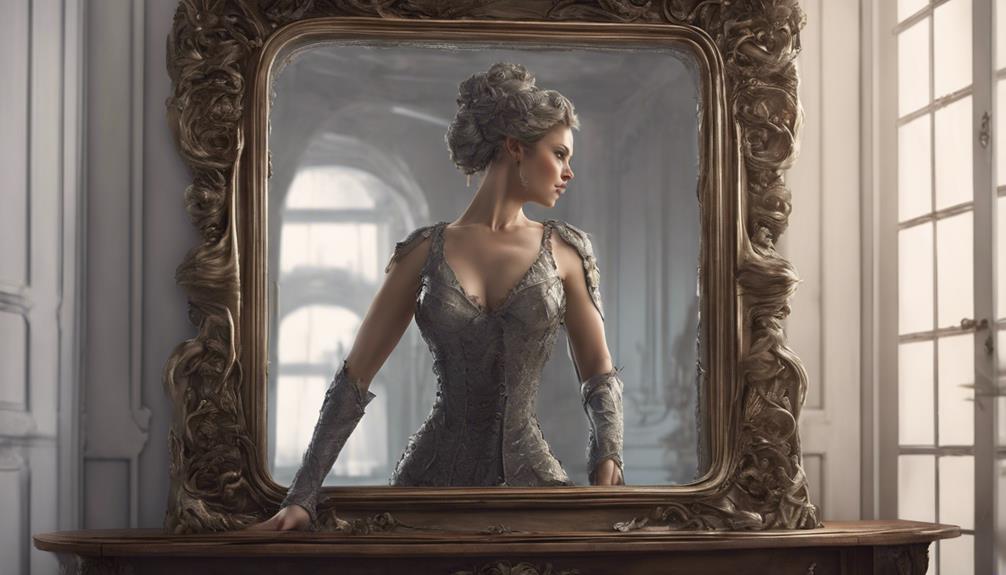Enter the enthralling universe of fiction dominated by 15 narcissistic characters, each boasting a distinct charm that keeps their complex personalities lingering in your thoughts well beyond the conclusion of the story.
As we delve into the twisted minds of these spellbinding individuals, prepare to uncover the depths of their manipulative schemes and power-hungry ambitions, inviting us to question the thin line between fascination and repulsion in the realm of narcissism.
Key Takeaways
- Unchecked narcissism leads to calculated actions with severe consequences.
- Manipulative behavior triggers downfall and loss of relationships.
- Charm masks manipulative tendencies, drawing others into deceit.
- Inner turmoil and insecurities fuel toxic behaviors in these characters.
Patrick Bateman (American Psycho)
Patrick Bateman, the enigmatic protagonist of Bret Easton Ellis' 'American Psycho,' embodies a chilling portrayal of narcissism and psychopathy in the corporate world. His character delves into the dark realms of a narcissistic mind, intertwined with a gruesome reality of being a serial killer. Bateman's persona is a complex blend of superficial charm and monstrous tendencies, creating a facade that conceals his heinous acts of violence. His obsession with material wealth, physical appearance, and social status mirrors the shallow values often associated with narcissistic individuals. Through his calculated actions and manipulative behavior, Bateman exemplifies the dangers of unchecked narcissism and the blurred lines between sanity and madness.
Bateman's narrative in 'American Psycho' serves as a stark commentary on the dehumanizing effects of corporate culture and societal expectations. His descent into violence and depravity exposes the fragility of the human psyche when consumed by the trappings of success and power. The character of Patrick Bateman stands as a haunting reminder of the capacity for evil that can lurk beneath the veneer of charm and sophistication.
Professor Umbridge (Harry Potter)
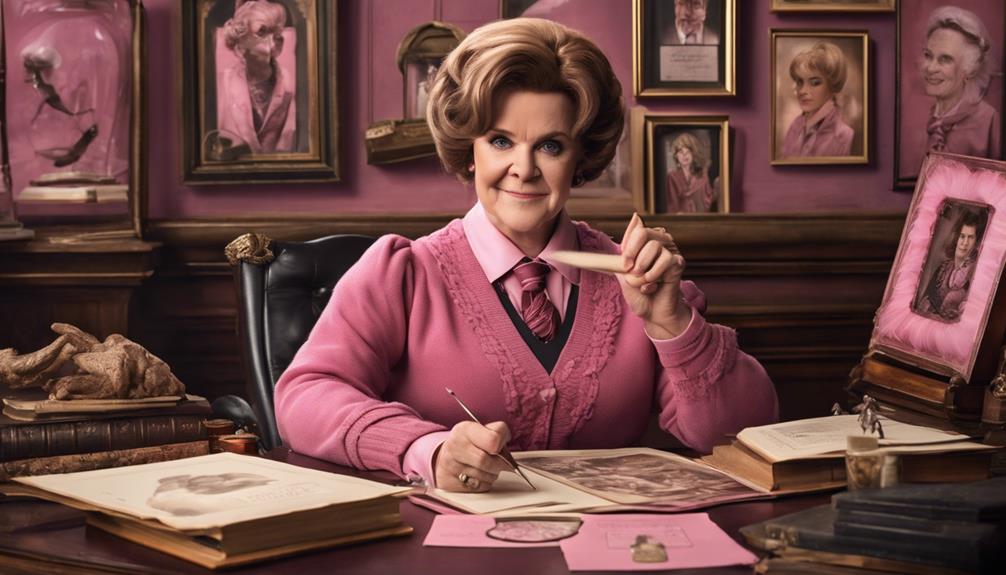
In the wizarding world of Harry Potter, Professor Umbridge emerges as a character embodying traits of cruelty and narcissism. Throughout the Harry Potter series, her actions reveal a disturbing pattern of behavior that showcases her narcissistic tendencies. As the Defense Against the Dark Arts teacher at Hogwarts, Professor Umbridge's cruel and sadistic nature becomes evident in her treatment of students, particularly her use of a blood quill to punish them. Her obsession with power and control, along with her unwavering loyalty to the Ministry of Magic, further underline her narcissistic behavior.
Professor Umbridge's pink attire and love for cats serve as superficial distractions from her true nature, which is characterized by manipulation and a lack of empathy. Her appointment as the Hogwarts High Inquisitor only amplifies her abusive behavior, as she enforces strict rules and stifles any opposition. In analyzing Professor Umbridge's character, it becomes clear that her narcissism drives her actions, making her a formidable and detestable figure in the Harry Potter universe.
Nate Jacobs (Euphoria)
Nate Jacobs' manipulative charm draws viewers in, showcasing his ability to navigate social situations with calculated precision. However, beneath his facade lies hidden vulnerabilities that hint at a deeper complexity to his character.
The toxic relationships Nate cultivates reflect the destructive nature of his narcissistic tendencies, painting a vivid portrait of a character embroiled in his own web of manipulation.
Nate's Manipulative Charm
With his manipulative charm, the character Nate Jacobs in 'Euphoria' captivates audiences through his ability to seamlessly shift between alluring charisma and sinister manipulation tactics.
- Manipulative Charm: Nate's charismatic facade masks his manipulative nature, drawing people in while concealing his true intentions.
- Lack of Empathy: His manipulative behavior is underscored by a distinct lack of empathy towards those he harms or manipulates.
- Need for Power and Control: Nate's actions are often driven by a deep-rooted desire for power and control over those around him.
- Destructive Impact: The consequences of Nate's manipulative behavior reverberate through the lives of those he encounters, leaving a trail of emotional destruction.
- Complex Narcissistic Traits: Nate's character exemplifies the intricate layers of narcissism, showcasing the nuanced interplay between charm and manipulation.
Nate's Hidden Vulnerabilities
Revealing the layers beneath his charismatic facade, Nate Jacobs in 'Euphoria' unveils a complex web of hidden vulnerabilities and insecurities shaping his toxic behavior. Despite his outward confidence, Nate struggles with internal turmoil stemming from a turbulent relationship with his father and a deep-seated desire for control.
These hidden vulnerabilities manifest in his need for dominance and manipulation, illustrating the intricate interplay between his insecurities and toxic actions. Nate's character in 'Euphoria' serves as a poignant portrayal of the complexities of narcissism, showcasing how childhood trauma can deeply influence one's behavior and relationships.
Through exploring Nate's internal struggles, the show provides a nuanced depiction of a multi-dimensional character grappling with the consequences of his hidden vulnerabilities.
Nate's Toxic Relationships
Marked by patterns of manipulation and control, the toxic relationships portrayed by Nate Jacobs in 'Euphoria' exemplify the destructive impact of narcissistic behavior on those in his orbit.
- Nate Jacobs from 'Euphoria' is a manipulative and toxic character who thrives on control.
- His relationships are characterized by manipulation, emotional abuse, and power plays.
- Nate's lack of empathy is evident as he uses intimidation tactics to assert dominance.
- Despite his charm, Nate's dark tendencies leave a trail of emotional turmoil in his wake.
- Through Nate's portrayal, viewers are warned about the dangers of toxic narcissistic behavior in relationships.
Regina George (Mean Girls)

Regina George's character in 'Mean Girls' exemplifies the intricate dynamics of manipulative charm. Her ability to wield power through social influence and calculated actions is a central aspect of her persona.
Ultimately, Regina's downfall highlights the consequences of using narcissism to control and dominate others.
Regina's Manipulative Charm
With her cunning manipulation veiled in charm, Regina George from 'Mean Girls' exerts a potent influence over her peers, solidifying her reign as the high school queen bee.
- Regina George's charm is a facade for her manipulative nature, allowing her to control those around her effortlessly.
- Her ability to use gossip and social status as tools for manipulation showcases her strategic approach to maintaining power.
- Regina's entitlement, lack of empathy, and desire for control are classic narcissistic traits that she embodies with precision.
- The calculated behavior and ruthless tactics she employs make her a captivating yet chilling depiction of narcissism in high school settings.
- Regina George's enduring status in popular culture underscores the impact of well-crafted narcissistic characters in fiction.
Regina's Power Play
Regina's manipulation tactics in 'Mean Girls' serve as a strategic power play that underscores her dominance in the high school social hierarchy. Through calculated schemes and psychological warfare, Regina George exerts control over her peers, solidifying her position as the queen bee.
Her adept use of manipulation, fueled by a thirst for power, allows her to influence social dynamics and maintain her reign at the top of the high school hierarchy. By leveraging gossip, intimidation, and her status, Regina orchestrates a web of influence that cements her authority and instills fear in those around her.
Her relentless pursuit of dominance and strategic maneuvers highlight her prowess in navigating the complex ecosystem of high school politics, establishing her as a formidable force to be reckoned with.
Regina's Ultimate Downfall
Exposing the toxic underpinnings of a facade built on manipulation and power, Regina George's ultimate downfall in 'Mean Girls' serves as a stark reminder of the repercussions of narcissistic behavior. Regina's spiral into downfall is a cautionary tale illustrating the destructive consequences of prioritizing control over genuine connections. Her loss of friendships and social standing underscores the emptiness of superficial dominance.
The narrative arc showcases the unraveling of Regina's carefully crafted image, revealing the vulnerability beneath her harsh exterior. As Regina's actions catch up to her, the audience witnesses the erosion of her power and influence, emphasizing the fleeting nature of authority built on fear and manipulation. Ultimately, Regina George's downfall highlights the critical importance of empathy in fostering lasting relationships and personal growth.
- Regina George's manipulative behavior triggers her downfall.
- Desire for power leads to isolation and loss of friendships.
- Cautionary tale on consequences of narcissistic behavior.
- Loss of social status and influence as consequences unfold.
- Illustrates destructive impact of narcissism on relationships and well-being.
James Moriarty (Sherlock)
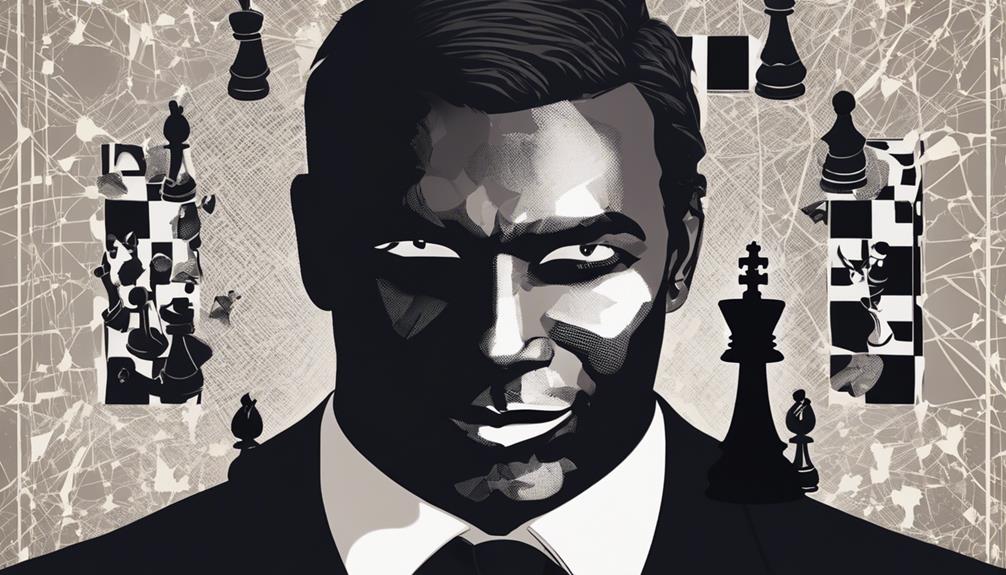
In the TV series Sherlock, James Moriarty emerges as a brilliant and manipulative criminal mastermind, serving as Sherlock Holmes' arch-nemesis with unmatched intellect and cunning. Moriarty's portrayal embodies the characteristics of someone with narcissistic personality disorder, evident in his relentless pursuit to prove his superiority over Sherlock. His grandiose plans to create chaos and his obsession with outsmarting his rival showcase a deep-rooted sense of entitlement and lack of empathy, classic traits of narcissism. Moriarty's manipulative and charming persona draws viewers into his web of deceit, making him a captivating and unforgettable character in television history.
Through Moriarty, viewers are exposed to the darker side of narcissism, where intelligence and charisma are used for malevolent purposes. His calculated schemes and psychological warfare against Sherlock not only highlight his cunning nature but also serve as a chilling reminder of the destructive capabilities of unchecked narcissism. Moriarty's character exemplifies the complex interplay between brilliance and malevolence, leaving audiences spellbound by his intricate mind games and sinister allure.
Vilanelle (Killing Eve)

Villanelle, as portrayed by Jodie Comer in Killing Eve, exudes an enigmatic charisma that draws viewers into her twisted world. Her psychological manipulation tactics, combined with a stylish fashion sense and lethal grace, create a character that's both alluring and chilling.
Through her lack of empathy, grandiosity, and manipulative behavior, Villanelle showcases the dangerous allure of narcissistic traits in a way that keeps audiences captivated.
Vilanelle's Enigmatic Charisma
With her enigmatic charisma, Vilanelle from the TV show Killing Eve captivates audiences through her alluring and chilling presence as a charismatic assassin. Vilanelle's glamorous and stylish fashion sense contributes to her allure, enhancing her narcissistic charm. Her cold-blooded nature and lack of empathy create a chilling yet intriguing character, showcasing the dark side of narcissism.
Viewers are kept on the edge by her manipulative and unpredictable behavior, revealing the complexities of her personality. Through twisted relationships and a captivating demeanor, Vilanelle stands out as a striking example of a narcissistic character in contemporary television.
- Vilanelle's glamorous fashion sense enhances her allure
- Her cold-blooded nature creates a chilling yet intriguing character
- Vilanelle's manipulative behavior keeps viewers on edge
- She showcases the dark side of narcissism
- Vilanelle's twisted relationships reveal her complex personality
Psychological Manipulation Tactics
Utilizing a range of psychological manipulation tactics, Villanelle from Killing Eve adeptly maneuvers through situations, employing charm, seduction, and unpredictability to assert control over others. Her actions often involve gaslighting, where she plants seeds of doubt in her victims, causing confusion and vulnerability.
Villanelle's skill in seamlessly transitioning between different personas and emotions showcases her expertise in manipulating those around her for personal gain. These calculated maneuvers not only highlight her narcissistic traits but also underscore her lack of empathy and concern for the well-being of others.
Villanelle's portrayal in Killing Eve as a master manipulator adds a captivating and chilling layer to her character, drawing viewers into her web of psychological intrigue.
Style and Lethal Grace
Drawing on her impeccable fashion sense and ability to effortlessly blend into any situation, Villanelle from Killing Eve exudes a style and lethal grace that captivates viewers and adds a layer of intrigue to her character. Her manipulative charm and unpredictable nature keep audiences on edge, showcasing her narcissistic obsession with power and control.
Villanelle's impeccable fashion sense not only reflects her confidence but also serves as a tool for manipulation, drawing others into her web of deceit. The lethal grace with which she carries out her actions is mesmerizing, highlighting her dangerous yet alluring persona. In the world of narcissistic characters, Villanelle stands out as a master of disguise and manipulation, using style and grace to further her agenda.
- Impeccable fashion sense
- Effortless blending into any situation
- Manipulative charm
- Obsession with power and control
- Lethal grace in actions
Chuck Bass (Gossip Girl)
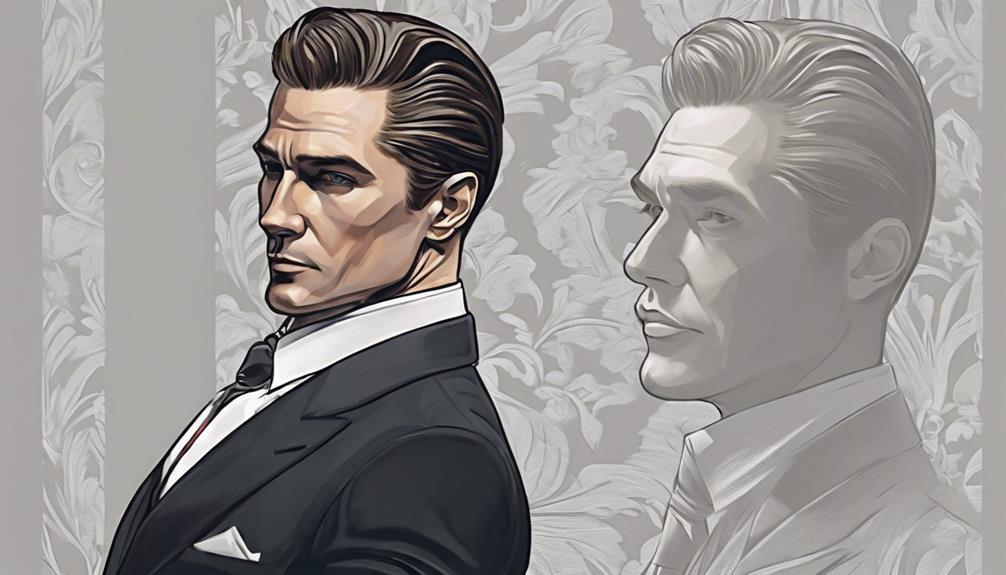
Chuck Bass from Gossip Girl embodies the quintessential narcissistic character, captivating audiences with his charisma and manipulative ways. Throughout the series, Chuck's manipulative behavior and narcissistic tendencies are on full display, drawing viewers into his complex world of privilege and power. His wealthy background and sense of entitlement fuel his manipulative actions, often leading to destructive consequences for those around him. Chuck's lack of empathy and desire for control further emphasize his narcissistic traits, making him a compelling yet troubling character to watch.
What sets Chuck apart is his ability to navigate intricate power dynamics and relationships, using his charm and manipulation to get what he wants. His complicated relationships with other characters in Gossip Girl showcase the depth of his narcissistic personality, shedding light on the destructive impact of unchecked narcissism in a high-society setting. Chuck Bass serves as a reminder of the allure and danger that narcissistic individuals can possess, leaving audiences spellbound by his complex nature.
Don Draper (Mad Men)

Don Draper's Charismatic Deception draws viewers into his world of secrets and enigma, offering a glimpse into his complex persona.
Unraveling Don's Secrets becomes a captivating journey as his facade slowly peels away, revealing the depths of his narcissism.
The Impact of Don's Persona on those around him portrays the destructive force of his manipulative and self-absorbed nature.
Don Draper's Charismatic Deception
Concealing a troubled past behind a facade of charm and confidence, the character of Don Draper in the TV series Mad Men embodies the captivating allure of charismatic deception.
- Don Draper, a central character in Mad Men, is known for his charismatic and deceptive nature.
- He's a successful ad executive who conceals a troubled past and leads a double life.
- Don Draper's charm, confidence, and manipulation skills make him a captivating but morally ambiguous character.
- His complex persona and enigmatic behavior keep viewers intrigued and guessing about his true motives.
- Don Draper's portrayal as a narcissistic character showcases the allure and consequences of living a life built on lies and manipulation.
Unraveling Don's Secrets
Unveiling the intricacies of Don Draper's enigmatic persona in 'Mad Men' reveals a character deeply entrenched in a web of deception and self-delusion. Draper's narcissistic tendencies, characterized by his manipulative nature and inability to maintain authentic relationships, drive the core of his character. His charm masks a man consumed by his own desires, often leading to destructive decisions and fractured connections with those around him.
Draper's manipulative behavior not only shapes his personal life, marked by infidelity and emotional detachment, but also influences his professional endeavors as an ad executive. The unraveling of Don's secrets sheds light on the intricate interplay between his narcissism, manipulative tendencies, and the tumultuous relationships that define his tumultuous journey in 'Mad Men'.
Impact of Don's Persona
Examining the impact of Don Draper's persona in 'Mad Men' reveals a complex blend of charm, charisma, and manipulation that captivates audiences while also showcasing the destructive consequences of unchecked narcissism in the high-pressure world of advertising.
- Enigmatic Charm: Don Draper's persona is built on an enigmatic charm that draws people in but keeps them at arm's length.
- Manipulative Charisma: His charismatic nature often masks manipulative tendencies that fuel power struggles within his personal and professional relationships.
- Narcissistic Traits: Don's narcissistic traits drive him to seek validation at any cost, leading to a cycle of self-destructive behavior.
- Broken Relationships: The wake of destruction left by Don's persona is littered with broken relationships and shattered trust.
- Cautionary Tale: Ultimately, Don Draper's persona serves as a cautionary tale, highlighting the perilous consequences of living under the facade of narcissism.
Mother Gothel (Tangled)
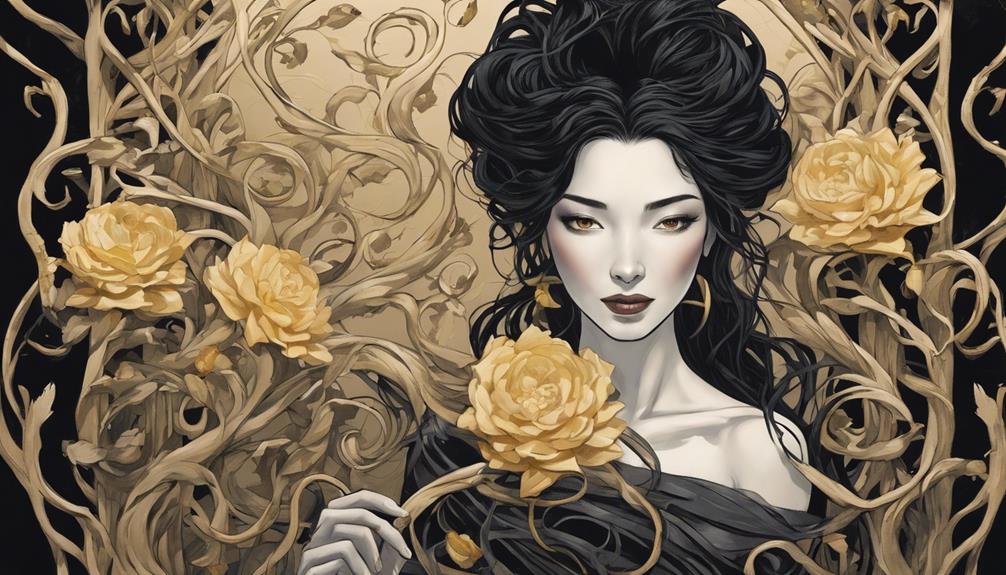
Mother Gothel from Disney's film 'Tangled' exemplifies a classic narcissistic antagonist through her manipulative control over Rapunzel and obsession with youth and beauty. In the story, Mother Gothel's narcissism is evident in her selfish desire to maintain her own youth and beauty by exploiting Rapunzel's magical hair. She manipulates Rapunzel by isolating her in a tower, instilling fear of the outside world, and distorting her perception of reality through gaslighting techniques. By controlling every aspect of Rapunzel's life and keeping her in ignorance, Mother Gothel asserts her dominance and feeds her own ego.
Her manipulative tactics are carefully crafted to ensure Rapunzel remains dependent on her, reinforcing Mother Gothel's sense of power and superiority. However, her downfall ultimately stems from her inability to maintain complete control over Rapunzel, as Rapunzel's growing independence and discovery of the truth lead to a climactic confrontation and Mother Gothel's ultimate defeat. Through Mother Gothel, Disney portrays a compelling portrayal of a narcissistic character whose manipulative nature drives the narrative forward.
The Joker (The Dark Knight)
Chillingly charismatic and unpredictably chaotic, the Joker, as portrayed by Heath Ledger in 'The Dark Knight,' embodies a mesmerizingly narcissistic character with a penchant for creating havoc and manipulating those around him. This fictional character has left an indelible mark on audiences worldwide with his twisted sense of humor and nihilistic worldview.
- The Joker, played by Heath Ledger, is a chillingly charismatic and unpredictable narcissistic character in the Batman universe.
- His chaotic nature, lack of empathy, and grandiose schemes make him a formidable antagonist.
- Ledger's iconic performance earned him a posthumous Academy Award for Best Supporting Actor.
- The Joker's obsession with power, control, and causing mayhem reflects the ultimate embodiment of narcissism.
- This character's presence in 'The Dark Knight' showcases the complexity and darkness that fictional characters with narcissistic traits can bring to movies.
Lord Voldemort (Harry Potter)

In transitioning from the enigmatic Joker to the malevolent Lord Voldemort in the realm of fictional characters, we encounter a dark wizard whose obsession with power and domination mirrors the chilling narcissism portrayed in the Harry Potter series.
Lord Voldemort, born Tom Riddle, exudes a profound sense of entitlement, believing himself to be above others due to his magical abilities and heritage. His insatiable desire for power drives him to extreme lengths, showing a complete lack of empathy for those he deems inferior, particularly Muggles and Muggle-born wizards.
Voldemort's need for control and domination over the wizarding world manifests in his ruthless pursuit of immortality and his willingness to use fear as a tool to maintain authority. Through Voldemort's character, readers witness the destructive consequences of unchecked narcissism on both the individual and society, making him a compelling and formidable villain whose legacy reverberates throughout the Harry Potter series.
Frank Underwood (House of Cards)
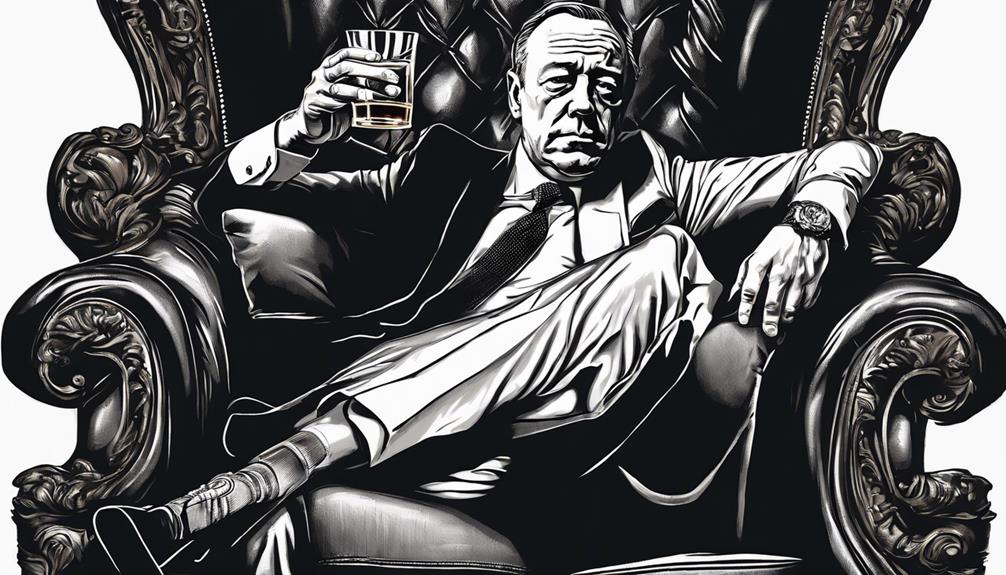
Frank Underwood, the cunning and manipulative politician in the TV series House of Cards, exemplifies the dark underbelly of politics with his ruthless ambition and Machiavellian tactics. His character showcases the complexities of power dynamics and moral corruption, leaving viewers both intrigued and disturbed.
- Underwood's ruthless ambition and lack of empathy drive his actions.
- His willingness to manipulate and deceive highlights the darker aspects of politics.
- Underwood's Machiavellian tactics make him a formidable player in the political arena.
- The nuanced portrayal of his character by Kevin Spacey earned critical acclaim.
- Underwood's calculated and strategic nature adds depth to his morally corrupt persona, making him a captivating yet morally reprehensible figure in the show.
Frank Underwood's portrayal serves as a cautionary tale, illustrating the dangers of unchecked ambition and the lengths some individuals will go to in pursuit of power.
Cersei Lannister (Game of Thrones)

Cersei Lannister, a complex and compelling character from the TV series Game of Thrones, exemplifies the dangers of unchecked narcissism through her ruthless and manipulative nature, constantly prioritizing her own interests above all else. Her thirst for power and control in the realm of Westeros drives her to manipulate those around her, making her a formidable force to be reckoned with. Cersei's character arc vividly portrays the consequences of allowing narcissism to rule one's actions, showcasing how it can lead to destructive outcomes for both the individual and those entangled in their web of deceit.
| Traits | Description |
|---|---|
| Manipulative | Cersei's cunning strategies and manipulative tactics serve her thirst for power. |
| Ruthless | She demonstrates a ruthless nature, willing to eliminate anyone in her path to maintain control. |
| Power-hungry | Cersei's relentless pursuit of power drives her decisions, often at the expense of morality and ethics. |
Gilderoy Lockhart (Harry Potter)
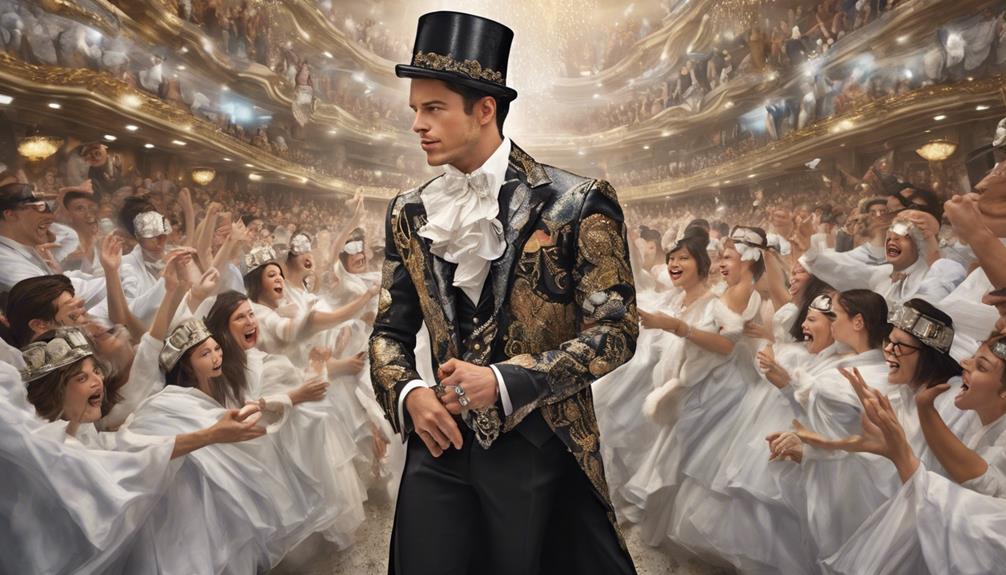
Exhibiting a facade of charm and heroism, Gilderoy Lockhart in the Harry Potter series embodies the perilous allure of unchecked narcissism within the wizarding world.
Key Points:
- Lockhart, a fictional character in Harry Potter, showcases narcissistic traits such as self-importance and a thirst for admiration.
- Despite his fame as a wizarding celebrity and author, Lockhart is ultimately exposed as incompetent and deceitful.
- His character serves as a cautionary tale about the dangers of unchecked narcissism and the consequences of living a life based on falsehoods.
- Lockhart's exaggerated tales of heroic adventures highlight the thin line between self-confidence and self-delusion.
- Through Lockhart, J.K. Rowling skillfully illustrates the pitfalls of prioritizing one's image and ego above genuine virtues and abilities in a world where appearances can be deceiving.
Darth Vader (Star Wars)
Gilderoy Lockhart showcased prominent narcissistic traits in the Harry Potter series, and transitioning to the iconic character Darth Vader from Star Wars, we encounter another compelling figure deeply entwined with themes of redemption and the consequences of succumbing to dark desires.
Darth Vader, originally Anakin Skywalker, evolves into the formidable Sith Lord due to his fear of loss and quest for power. His imposing presence, amplified by his menacing appearance with the black armor and helmet, symbolizes the internal conflict he grapples with. Vader's journey is marked by a struggle between his former self and the dark side he embraces, highlighting themes of redemption and sacrifice.
This inner turmoil not only shapes Vader's character but also serves as a cautionary tale about the dangers of giving in to narcissistic tendencies. Through Vader's complex narrative, audiences are compelled to contemplate the intricacies of redemption, the weight of choices, and the enduring battle between light and darkness.
Frequently Asked Questions
What Fictional Characters Have a Narcissistic Personality Disorder?
We've identified several fictional characters who exhibit traits associated with Narcissistic Personality Disorder. These characters include Cersei Lannister from 'A Song of Ice and Fire,' Patrick Bateman in 'American Psycho,' Lord Voldemort in 'Harry Potter,' Joffrey Baratheon from 'A Song of Ice and Fire,' and Don Draper in 'Mad Men.'
Each of these individuals displays behaviors and characteristics that align with the diagnostic criteria for Narcissistic Personality Disorder.
Who Do Narcissists Usually End up With?
We often find that narcissists end up with partners who possess qualities like empathy, accommodation, and a willingness to meet their needs. These individuals serve to boost the narcissist's ego, fulfilling their insatiable craving for validation and attention.
The partnership is typically characterized by manipulation and control exerted by the narcissist, resulting in a toxic and unbalanced relationship where the narcissist dominates, and the partner accommodates.
What Kind of People Do Narcissists Hang Out With?
We find that narcissists tend to gravitate towards individuals who bolster their ego and validate their sense of superiority.
They often seek out those who they perceive as inferior or easily manipulated, as these individuals are less likely to challenge their behavior.
Who Does a Narcissist Get Obsessed With?
We get obsessed with individuals who boost our ego and admiration, often fixating on those we perceive as superior or powerful. Targets are usually those challenging our self-image or threatening our control.
Our obsession stems from the need for validation and attention from specific people. This fixation can be intense and all-consuming, driven by a desire to maintain dominance and control over those we see as threats.
– What are some fictional characters that exhibit narcissistic traits and tactics?
Some fictional characters that exhibit narcissistic traits and tactics include Patrick Bateman from “American Psycho,” Regina George from “Mean Girls,” and Cersei Lannister from “Game of Thrones.” These characters use manipulation, gaslighting, and other narcissists’ psychological tactics to get what they want.
What Can Fictional Narcissistic Characters Teach Us about Toxic Relationships?
Fictional narcissistic characters can offer valuable insight into toxic relationships. By studying their behavior and the impact on others, we can learn warning signs, manipulation tactics, and the detrimental effects of these toxic narcissistic relationships insight on individuals. It helps us recognize and avoid such harmful relationships in real life.
Conclusion
In exploring the world of narcissistic fictional characters, we're drawn into a web of complexity and intrigue that leaves us spellbound.
Their manipulative behaviors and grandiose personalities serve as cautionary tales, reminding us of the dangers of unchecked narcissism.
As we delve deeper into their stories, we're reminded of the thin line between power and downfall, making for a riveting and thought-provoking viewing experience.
